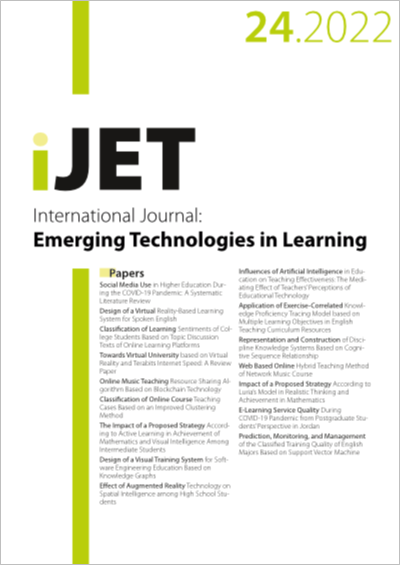Application of Exercise-Correlated Knowledge Proficiency Tracing Model based on Multiple Learning Objectives in English Teaching Curriculum Resources
DOI:
https://doi.org/10.3991/ijet.v17i24.35417Keywords:
EKPT model, multiple learning factors, English online teaching, prediction and analysisAbstract
The advanced invention of information technology overcomes the limitations of traditional teaching methods. The English-oriented online teaching system not only has rich course resources, but also provides technical support for students’ personalized learning. Therefore, using big data mining techniques may help to analyze students deeply and develop personalized study plans and content. Aiming at the deficiencies of online English teaching platform in the task of knowledge level diagnosis, an Exercise-correlated Knowledge Proficiency Tracing (EKPT) model that integrates multi-objective learning factors is proposed. The learning model maps students and practice information into meaningful knowledge space through practice and knowledge-related information, and quantifies students’ knowledge learning process through forgetting curve theory and learning curve theory. The experimental test results show that the EKPT model has the best performance in knowledge ability prediction and learning performance prediction. The mean absolute error (MAE) values of the EKPT model in the English1 dataset, English2 dataset, written auxiliary dataset and adaptive dataset are 0.32, 0.25, 0.39 and 0.34, respectively, with the smallest error. Therefore, the proposed EKPT model meets the requirements of English online learning. The research content has important reference value for the construction of online English teaching platform.
Downloads
Published
How to Cite
Issue
Section
License
Copyright (c) 2022 Huiyong Yang, Hamzeh Mohammad Alabool

This work is licensed under a Creative Commons Attribution 4.0 International License.



